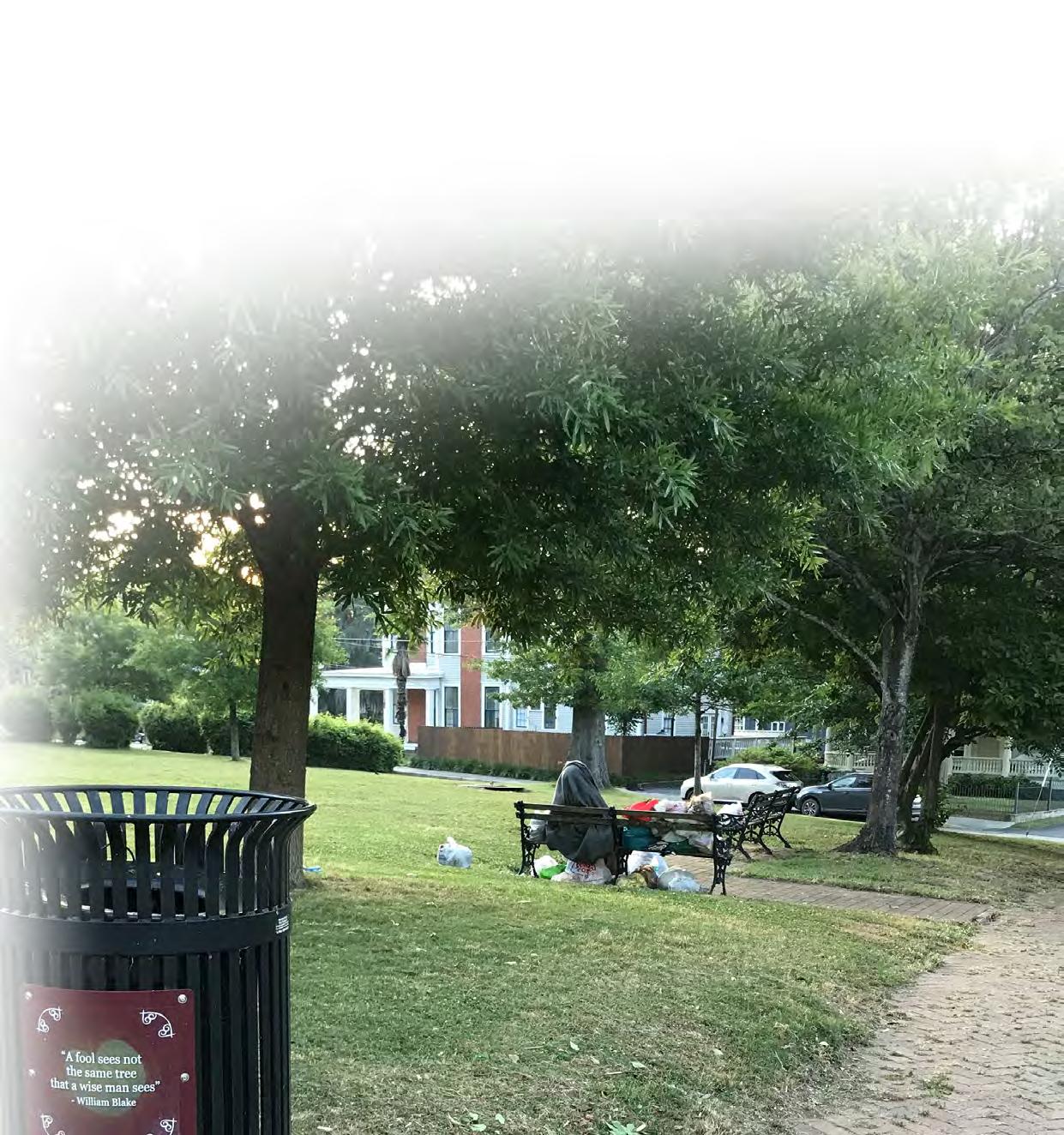
23 minute read
Finding God in Macon, Georgia
by Anna. M. Ross
For the first time visitor to Macon, Georgia, there is no better guide for exploring this Middle Southern city than with Sister Elyse Staab, current Sister Servant of the Daughters of Charity’s House, located on the grounds of St. Peter Claver Catholic Church and School. Sister Elyse shares the house with three Daughters – Sisters Cheryl Hillig, Kate McFall and Theresa Sullivan – and Postulant Alex Vizard, who has been with the four Daughters for 10 months and soon to leave to enter the Seminary. The five each has a ministry to attend to, each day an opportunity to carry out their founders’ charism, “to go out and serve those in need, to see the face of God in all whom they serve.”
Advertisement
Along the tour route, the senses are heightened, alerted to a wealth of wonders: the sense of awe felt in the sacred setting of the Ocmulgee Mounds National Historical Park, a preserve of over ten millennia of Native American culture; the sense of nostalgia evoked in the echoing notes of Macon’s musical legends, Otis Redding and Little Richard, whose achievements offer Macon’s youth a purpose for passion to reach one’s dream; the sense of homage paid at the Tubman Museum, where the African American journey is traced and celebrated; the scented sense of 300,000 Yoshino Cherry Trees that annually announces the arrival of spring. Macon presents postcard-perfect parks, scenic river trails, lush gardens with cascading fountains and brick-lined paths leading to stately antebellum homes. Even the historic Riverside cemetery with its 19,000 souls, offers respite, a bridge that lends clarity to matters of the earth and comfort in the promise of an eternal life to come.
Yet, as with all cities and their people, outward appearances can be deceiving; there’s a need to scratch below the surface and uproot the tangled weeds. The need to seek – and to find – the face of God. In Macon, God can be found – if one knows where to look.

In 1991, three Daughters of Charity arrived in Macon in answer to a request for help from the Diocese of Savannah. Sister Elyse, one of the three original Daughters, would help set up and serve as administrator of Nazareth Home, a residential facility that offered practical and compassionate care to single expectant women and their babies. Thirty years later, the former residence is now home and office to Family Advancement Ministries (FAM), a multi-family service agency that provides resources and financial assistance to mothers and families, including Macon’s growing Hispanic population.
The grounds of St. Peter Claver church and school are located just off the interstate. Upon entry, a sense of sanctuary is revealed, with a statue of the Sacred Heart on a pedestal, arms outstretched in welcome.
The history of the Daughters’ house and the school continues through its mission today. St. Katharine Drexel, a Philadelphia heiress, philanthropist and the Blessed Sacrament Order’s first Sister, was devoted to promoting racial justice, particularly toward African Americans and Native Americans. In 1903, she founded St. Peter Claver Catholic School to “give children of every race the education they need.” And deserve.
Front row: Sister Theresa Sullivan, Postulant Alex Vizard, Sister Cheryl Hillig. Back row: Sister Kate McFall and Sister Elyse Staab
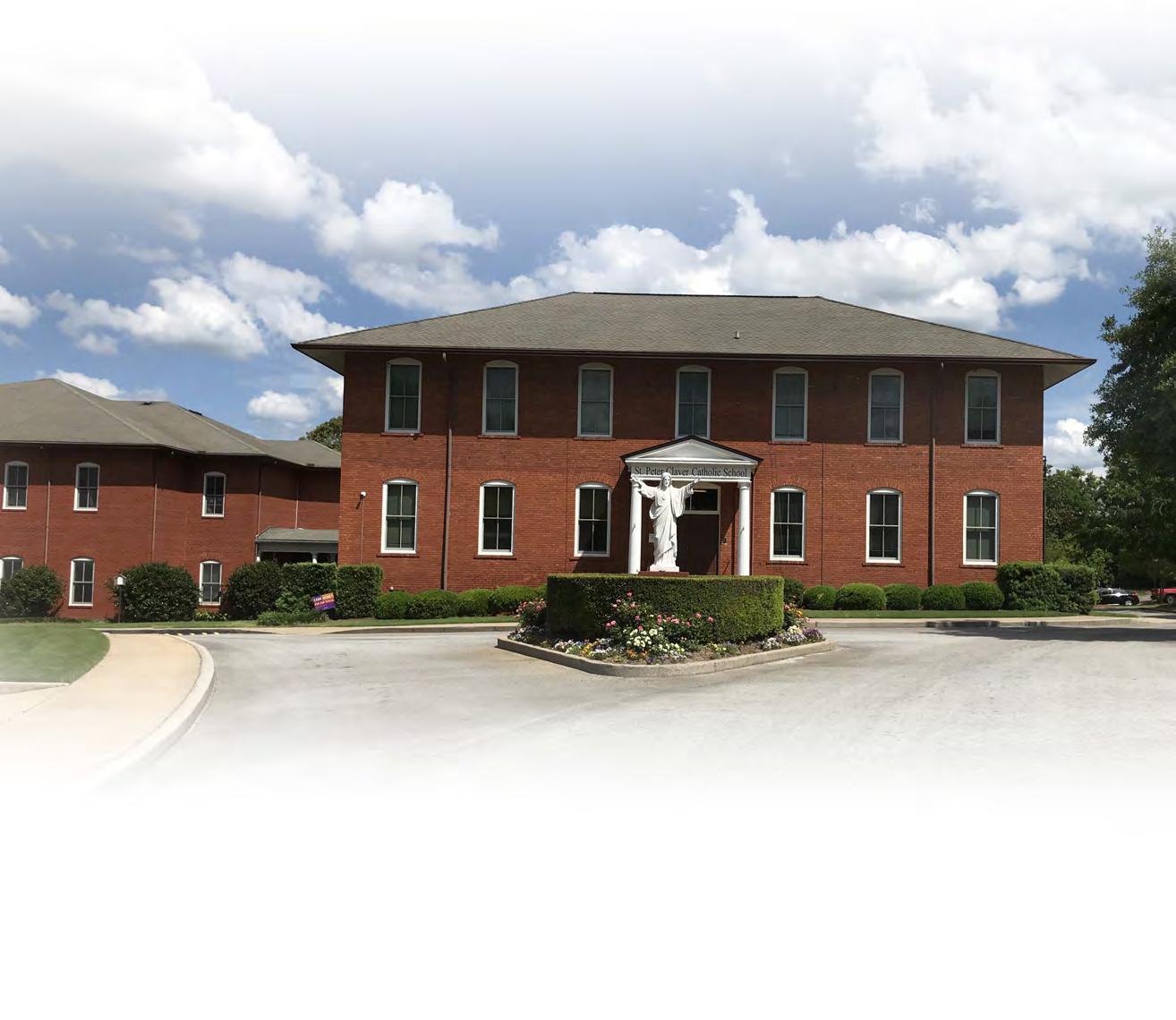
“Surprise us with love at daybreak …”
For Sister Theresa, director of Depaul USA Daybreak Resource Center for the homeless, dawn is precious, an awakening with the promise of God’s love given – and received – for those she serves. Following Mass at the Daughters’ house, Sister Theresa gets in her car, her usual haste checked by the car following her and a need to brake with arm extended to point.
Two of the four low-income homes they support are shown. There’s also a stop for a brisk walk along the cemetery grounds where weathered stones bear witness to the final journey of those of all faiths
The final stop before nearby Daybreak is an encampment, tucked deep within the woods alongside the 200mile Ocmulgee River. Tents are spaced apart, with room for possessions on the ground, a collection of coveted objects that signal to all the property is private.
It’s early still, and as yet unknown who remains inside. A man named Kenneth hears Sister calling and emerges, hurrying to catch up. Kenneth wants to explain a situation, a misunderstanding that occurred at Daybreak. Sister gives him her full attention, listening intently, patiently.
Yet, while the focus remains fixed, Sister’s eyes suggest a process, a mental recap of the situation. She’s already moved on, quickly parsing Kenneth’s needs, offering him solutions: Loaves and Fishes Ministry for food; meet with the assistant director and security guard at Daybreak to discuss readmittance; contact the agency responsible for ensuring he gets his checks.
As Sister Theresa confides later, “Every ministry I have had through the years, has helped me with the next.” As the eighth of 12 children, Sister Theresa knew from an early age what she wanted to do – and to become – one day. Taught by the Daughters in high school, Sister Theresa would go with them into Chicago’s inner-city, visiting at a nursing home where many of the patients had been homeless. She entered the community immediately after high school. “It was a decision that I realize my parents would probably have preferred that I had waited to make until I was older, but I knew in my heart that this was God’s plan for me.”
Daybreak opened in 2012 through the efforts of its first director, Sister Elizabeth Greim, and Depaul USA. In 2017, Sister Theresa took on the director role. The facility, a former 6,000-square-foot manufacturing warehouse, offers hope to nearly 100 persons a day with a variety of services: laundry facilities, showers, meals, phones, computers, transportation, free health clinic and, most important, housing and housing placement.
Sister Theresa quickly gets up to speed with the day’s agenda: introductions all around, including volunteers such as Steve Corkery, who has been picking up and bringing in doughnuts from the local bakery every Monday for the past five years.
A longtime member of the St. Vincent de Paul Society and its current treasurer, Steve also serves on Daybreak’s Advisory Council, which meets monthly with area church leaders of all denominations who have pledged financial support. Steve talks about annual events so crucial to the running of the facility: a theater dress rehearsal with proceeds earmarked for Daybreak; the Skydog Music Festival, a concert in tribute to the Allman Brothers; and Sleepout, an overnight sleepover in tents to show solidarity with those who sleep every night outdoors.
Subaru’s annual “Share the Love” national campaign has also blessed Daybreak. Led by former general manager of Macon Subaru and twice-weekly Daybreak volunteer, Ken Grinstead, the dealership annually contributes $250 to Daybreak for each car sold between Thanksgiving and January 4.
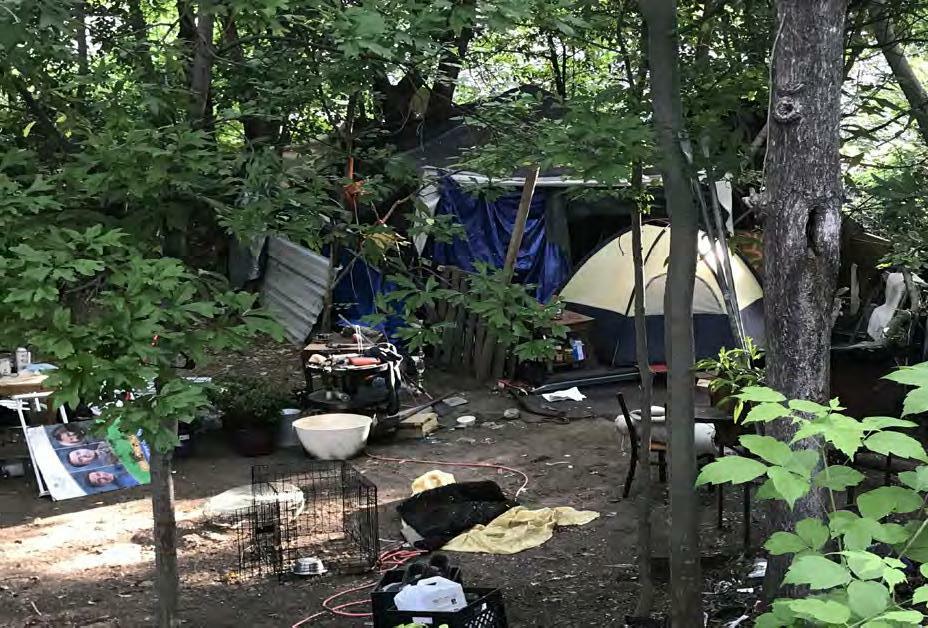
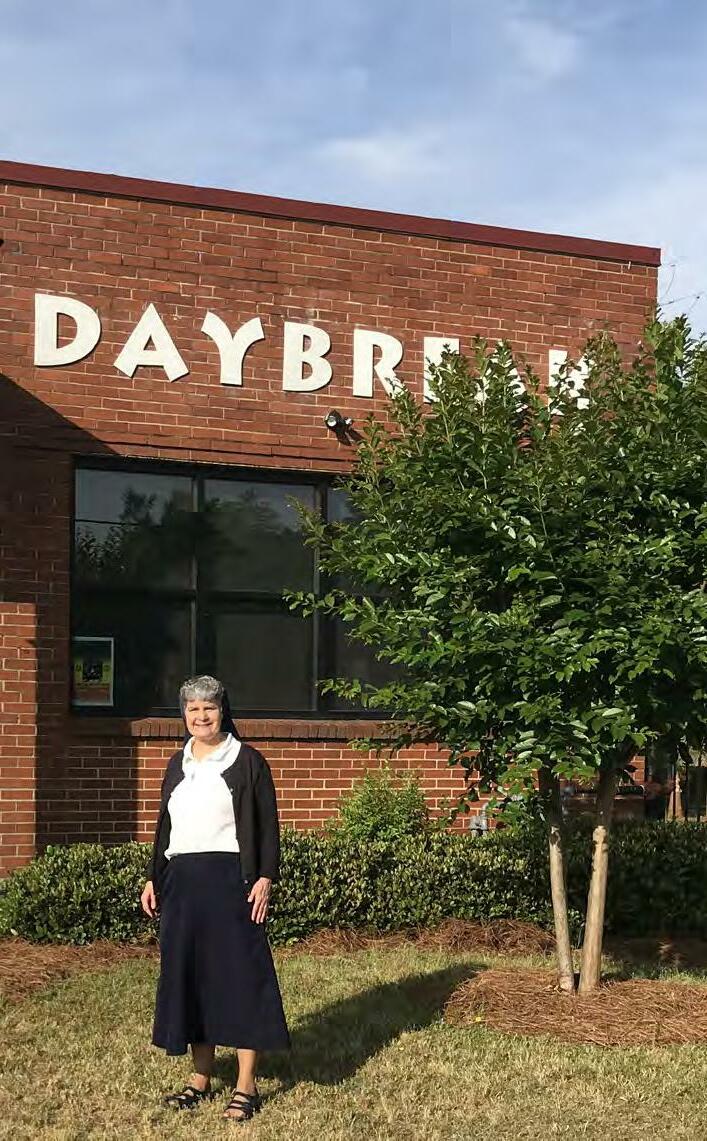
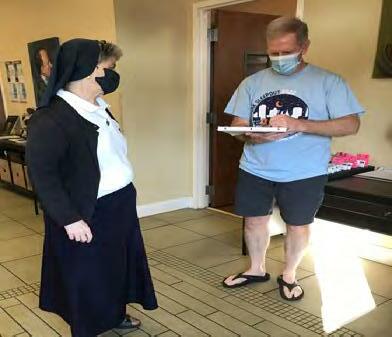
And although Daybreak is a haven for those who spend their days worrying about where they will spend their nights, there are also those in need themselves who contribute to creating a welcoming refuge.
Women such as Lakeya, who works at the front desk and was sent to Daybreak to complete mandatory community service hours. She expresses surprise at her reception, “I feel like I’m part of a family.”
Lakeya plans to continue working here when her service hours are complete. “I’m not homeless,” she says, “but Daybreak feels ‘homish,’ to me. I feel lucky and blessed to have been sent here.” A wide smile, then a phone to answer. “I want everyone who walks through this door to feel as welcome as I did.”
Mark S. is a self-described “jack-of-all-trades,” who volunteers and helps with security at Daybreak. And, like Lakeya, Mark feels at home and appreciated at Daybreak.
Suddenly homeless after leaving Baltimore, Mark knows that “God led me to Daybreak for a reason. He showed me that I have purpose, that I have reason to believe in myself,” he says agreeably.
“It was God who showed me that I have a gift with the people here,” he continues. “I listen, and they open up to me because I can understand what they’re going through.” Mark is at Daybreak every day, his purpose determined by the God he obeys and the director, Sister Theresa, whom he trusts and protects. Gary Musolf, treasurer of Depaul USA and his wife, Betty, secretary of the St. Vincent de Paul Society, are also Affiliates of the Daughters of Charity. Gary has dropped in at Daybreak, stopping briefly to talk about WEAR, a thrift store on First Street. Opened in 2015 with all proceeds directed toward Daybreak, Gary is always on the lookout for ideas for the store, the “thrift with a twist” upscale boutique; “where one’s dollar makes change.” But he leaves off the conversation, aware that his wife Betty is meeting with Sister Elyse tomorrow to discuss the couple’s work with the Vincentians and the Daughters.
Daybreak gets busier closer to lunchtime, and DeLois is just waiting, curled up in a comfy leather chair and glad to talk. She’s here often, but admits good-naturedly, “I like to keep to myself.” DeLois speaks of God as the One who is the first – and the last – word for me,” adding emphatically, “I’m not afraid of anything or anyone, except God.” Having grown up in Macon, DeLois has family here, but a stubborn fierceness for independence compels her to say, “I want to feel free, and I want to have a say in how I live my life. And only God will be the One I will be answering to.”
Mr. Cleveland has an apartment and car but came to the facility’s health clinic so that registered nurse, Sally Proffitt, could check out his painful leg. A preacher with a love for God and his fellow man, Mr. Cleveland has a generous heart and kind nature. He’s also a proud man. His family has offered to help, but he likes his independence, to have people rely on him rather than relying on others. As he states simply to his children, “I’m the father.”
In conjunction with the Macon Housing Authority, 82 units of housing in three, three-story buildings with 16 designated units for the chronically homeless will open in 2023. The first of its kind, the facility includes an 11-bed medical respite program for those with nowhere to go after discharge from the hospital and a four-room medical clinic that provides dental and primary healthcare.
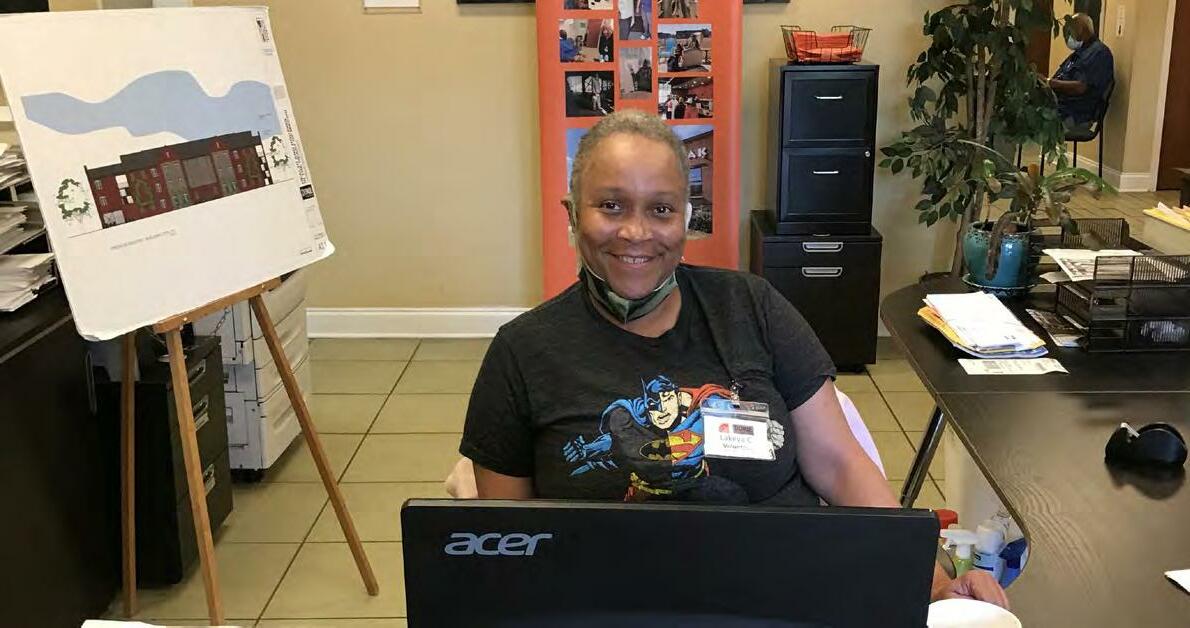
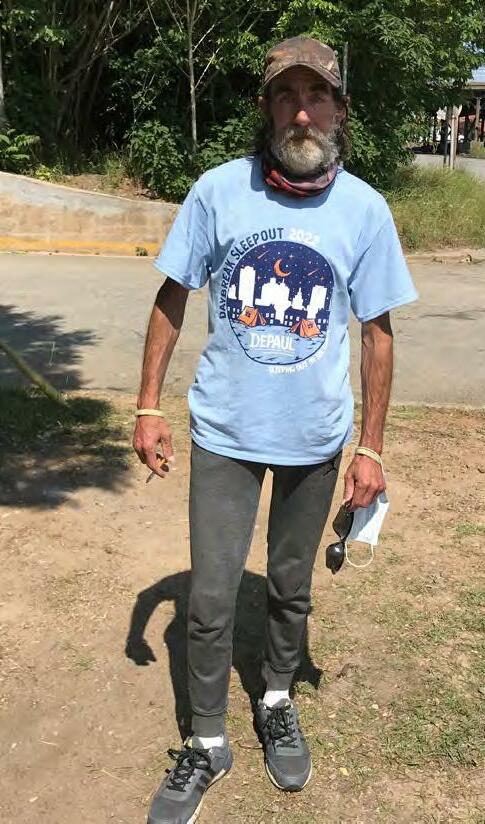
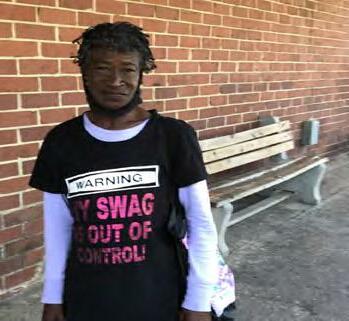
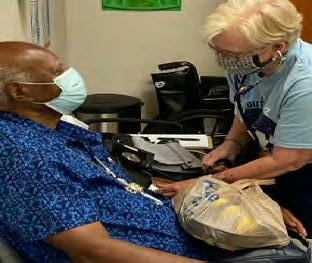
Sister Cheryl, principal of St. Peter Claver School and kindergarten teacher, Sister Kate McFall, walk from their house to the school, about fifty feet away. Sister Kate heads to her classroom while Sister Cheryl stands in front on the sidewalk, greeting students and taking temperatures. School traffic moves smoothly, a door slam and then a quick parental wave.
As Sister Cheryl says later that morning, “Although the majority of our students” – a multicultural and predominantly African American population – “are not Catholic or even a part of the St. Peter Claver parish, parents have consciously made the decision to send their children here. One parent drives an hour each way every day while others make great sacrifices to pay as much of the private school tuition as they can.”
However, tuition costs don’t cover operating costs, and Sister Cheryl, along with Development Director, Regina Sweeney continue to reach out to every resource available to keep the school open. Alex, postulant at the house, works part-time with Regina to meet the challenge of operating costs of a K3-8th grade school.
Sister Cheryl has been principal at St. Peter Claver Catholic School (SPCCS) for the last eight years. A native New Yorker, Sister Cheryl had never been farther south than Maryland before being missioned to Macon. She smiles, then admits, “While I feel blessed to serve here, I wouldn’t mind a brisk Northern breeze to blow through once in a while!”
SPCCS currently has 165 students; most students are non-Catholic, and they represent 56 different churches in and around Macon, which Sister Cheryl finds helps enrich her own Catholic faith.
“We all worship the same God,” she says. “We just worship differently!” She continues reflectively, “The encounter between God and my students that takes place each day is what, I believe, gets me out of bed in the morning.” Getting to know the families is also an aspect of her role that Sister Cheryl especially enjoys. “As the head of the school, I have the unique position of interacting with families on many different levels. I can celebrate good news with them, I can walk with them through hard financial times and I can console them when tragedy and sorrow touch their souls.”
With students and their families from many different socio-economic backgrounds and different faith traditions, Sister Cheryl states that “It brings richness to our school community. Parents sacrifice so much to send their children to our school. Our students are very prepared for high school and can compete with any other students in gaining acceptance to elite high schools. Academic excellence is demanded from all our students and the students rise to the occasion,” she says, with a touch of humility – and a hint of pride.
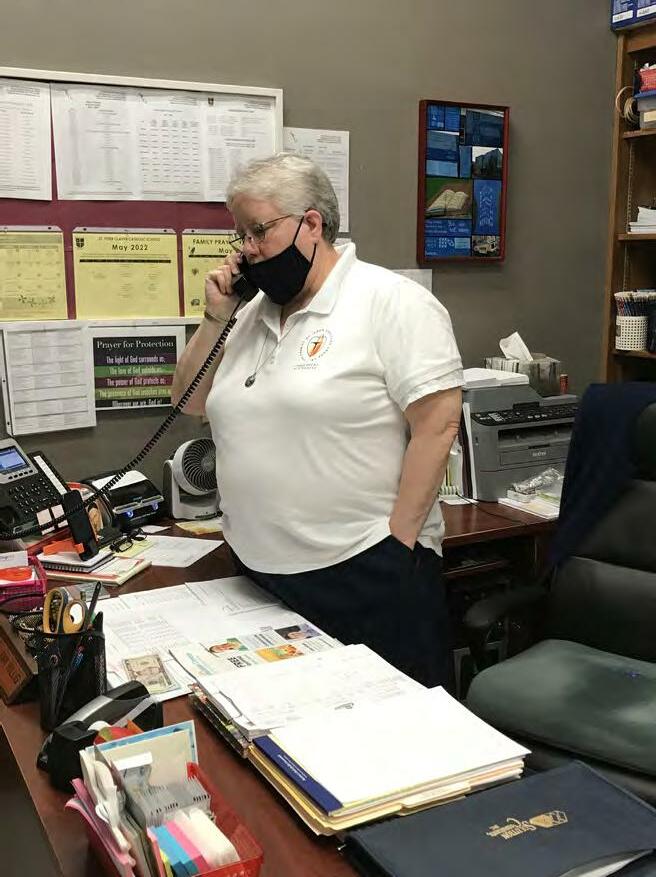
Kindergarten teacher Sister Kate was sent on mission to St. Peter Claver School in May of 2020, following nearly two years in Seminary. With both a bachelor’s and master’s degree in elementary education, Sister Kate has met the challenge of teaching a classroom of five- and sixyear-olds with a supply of colorful teaching tools designed to hold even the squirmiest of children’s attention. All the senses are engaged in Sister Kate’s class: singing, jumping, dancing, rhyming; the class moves seamlessly from one lesson to another. As Sister Kate says, “I want my students to understand the why of words, the meaning behind learning to read, not to just memorize and later, have nothing to build on.”
Sister Kate’s class even includes using sign language when reading or reciting aloud, another sensory tool that stimulates the mind. An opening lesson is “playing” the ‘secret stories’ game.” Seated on brightly colored numbers, the children raise their hands, eager to be picked first, adhering to Sister Kate’s cardinal rule of the classroom: “Raise your hand to speak or stand.” Pairs of lettered sounds are carefully considered and the class reacts accordingly: “au” and “aw” are two sounds that “have a crush on each other,” because “when you see someone you like,” the youngsters shout in chorus, “you say ‘Aww’!’’
Lessons are presented in short increments, attention spans and sitting still in the early stages of development. When asked about the rumored countdown from 10 for students to sit down or stop talking, Sister Kate lifts a brow and offers a knowing half-smile, “I start from 3.” Yet, clearly Sister Kate loves her students – and the affection is returned. As one youngster was heard to say quietly to her neighbor: “I love learning!” The whispered response came quickly: “So do I!”
Having lived in a volunteer community and a discernment house, Sister Kate has come to accept that no matter the vocation – single, married, religious, apostolic – there will be challenges. “Yet,” she says, “there are certainly rewarding times, too, in community.
“There is no ‘perfect,’ life” she continues. “It’s finding and accepting the life you are called to do, the one that will bring the most joy.”
Sister Kate had experienced community with friends, but could she live in community as a religious? And where should she begin to look?
Sister Kate, a selfdescribed “planner,” went online to search for where she might belong, setting parameters to find the perfect fit to answer God’s call.
“With over 100 communities listed,” she recalls, “the Daughters weren’t even on it, and I ended up discerning with another community. As I grew to know their community, I woke up New Year’s Day and realized that the community wasn’t the right fit for me.”
Sister Kate returned to searching online with a different set of parameters, and the Daughters of Charity appeared, leading her on the path toward her vocational calling.
Sister Kate continues to connect online with others – teachers, friends, religious, family – who help Sister Kate grow in her ministry as a teacher, offer spiritual growth as a Daughter, remain close to family and friends, and enrich her apostolic life in community. And, of course, help to ensure that a classroom of God’s littlest angels will continue to realize just how fun learning can be.
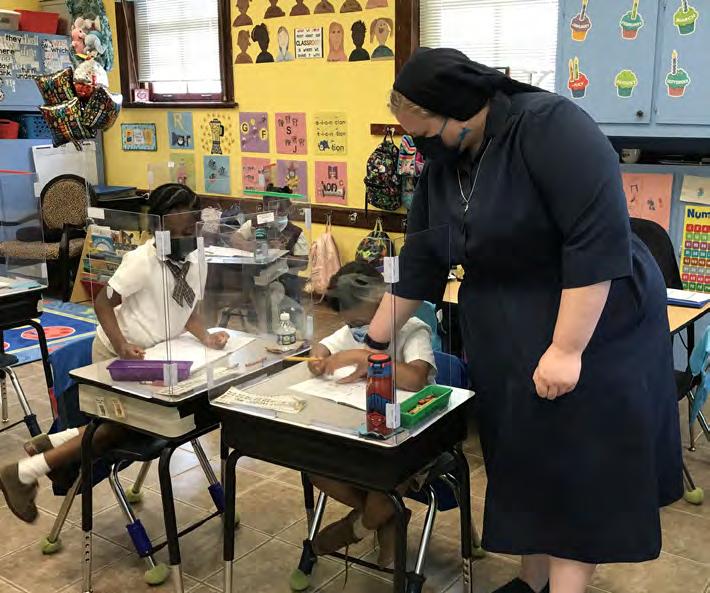
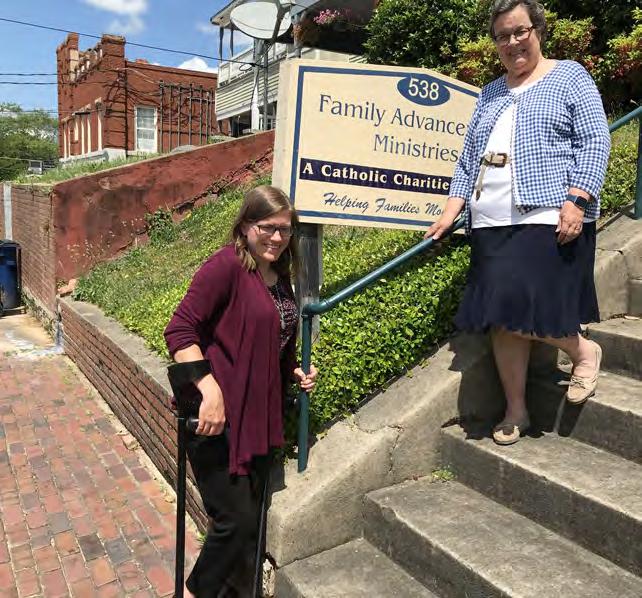
Family Advancement Ministries (FAM) opened in Macon in 2007 as a result of the merger between two of the Daughters of Charity ministries, Nazareth Home and Mother & Child Ministry As defined by its mission statement, FAM is a “Catholic, diocesan social service organization that nurtures reverence for life by responding to the physical, emotional and spiritual needs of families with the goal of moving families toward independence and self-sufficiency.”
Gigi Rolfes, FAM’s executive director, and Alex sit down one afternoon to talk about the important role FAM has in the Macon community. The list of services is long — from providing financial assistance toward rent, utilities and practical items such as car seats, bottles, infant and toddler clothes and food, to offering workshops on personal finance and nutritional needs. For the Hispanic community, FAM assists in helping to find work with programs such as ESL classes, citizenship, finance and legal rights.
Alex has appreciated the direct contact with the families she’s found by working with Gigi, who pulls from a long list of resources and contacts to assist FAM’s clients. Gigi shares a story that illustrates the hardships that many Macon families face, one of many stories that she hears every day.
A young woman contacted them; a mother of two young children who was pregnant with a third. The woman had a job, but was unable to work after contracting COVID. While in the hospital, she delivered the baby, who, too had COVID and died shortly after birth. When the woman returned home, she found an eviction notice from the landlord. What could she do?
In a situation like the above, Gigi said she would contact the landlord, the hope being the landlord would extend the lease for a few months and FAM could cover costs. The arrangement would give the mother time to get back on her feet, return to work or find a better-paying job, while Gigi and staff would use the time to network with other agencies in finding a permanent solution for the mother and her family.
An annual highlight at FAM is the children’s Christmas present drive. Thank-you signs from grateful parents are taped to the refrigerator. Parents who have witnessed the joy of their children discovering gifts under the tree with their names on them from Santa; knowing they and their children are not invisible – and that they are loved.
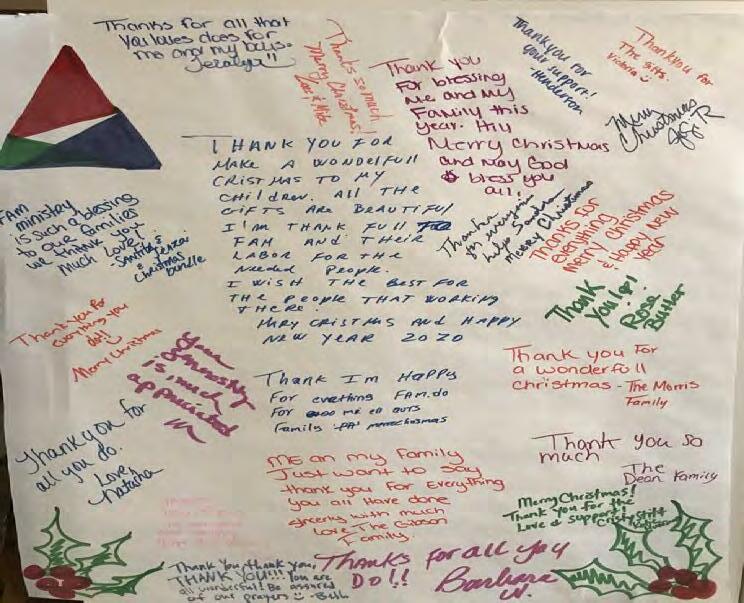
“Go to the poor: you will find God.”
Sister Elyse returned to Macon in 2009 after serving a nine-year term as Visitatrix. When asked about her time in Emmitsburg, she admits that “I was shocked that I had been named… and I remember saying to the Holy Spirit: ‘Help me!’– and I was not disappointed.”
Sister admitted that she often claimed, “I have had a very checkered background – I’ve never done the same thing twice!” But from her time as one of the first Daughters to be sent on mission in the South, in Macon Sister Elyse has essentially come full circle.
“As I look back to my earliest days in Macon,” she says today, “I realize how blessed I was to have been one of the first to introduce the Vincentian charism to this part of the world. I have watched the growth, the interconnectedness of the Vincentian spirit and the collaboration among the ministries and the love and support they offer one another. This is the ultimate gift for me and for the wonderful people of Macon.”
Today, Sister Elyse serves in the Vincentian Family Ministry as a coordinator, with an office at The Kolbe Center, a Catholic non-profit agency that assists women with unplanned pregnancies by providing support before and after the birth. The space is ideal for Sister Elyse, where she is equipped with all the tools necessary in her role as a coordinator of the Daughter of Charity Affiliates, as well as the Women of Charity, former Daughters who continue to live out the Vincentian charism in their lives as lay women. Betty Musolf, current secretary for the local conference of the St. Vincent de Paul Society, arrives at The Kolbe Center. Betty speaks openly about the joy she and husband Gary have experienced as Affiliates of the Daughters of Charity, and the support they have received through the years.
Betty speaks of an especially memorable trip to Rome in 2017, where the couple (along with nearly 10,000 others), attended the celebration of the 400th anniversary of the Vincentian charism. As Betty says, “We have met and received such support from other Affiliates, they’ve become friends as well.” When asked about WEAR, Betty laughs and says good-naturedly, “I think Gary knows more about fashion and what’s in style than I do now. He loves seeing how everything is displayed and coming up with ideas to draw shoppers in.”
Betty Musolf and Sister Elyse
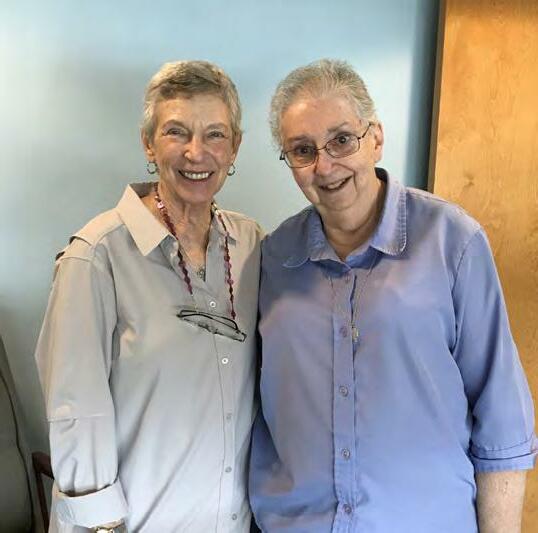
Giving thanks at the table
Supper at the Daughters’ House is at 6 p.m., a simple but delicious and filling meal prepared by the Sisters on a rotating basis. Following grace, the group appears to visibly relax, a small drop of the shoulders in the process of letting go of the day without worry for the next. It’s a time to share, to catch up with one another’s day, or to simply sit back and listen. Alex and Sister Kate, the younger adults at the table, are open and engaging. Alex, with a seemingly insatiable appetite for chocolate in all forms, opens the conversation with a recounting of her day’s desserts.
Which in turn, leads to Sister Kate’s recommendation of Buc-cee’s, a Texas gas station chain, whose mega-offerings rivals the size of the Lone Star State. It’s pleasant, entertaining, the chatter one expects among family.
The enthusiasm and energy of Alex, soon to enter the Seminary, illustrates the newness and awakening of life in community; the expectations and the rewards of a shared life. Sister Kate talks about platforms and her online community connections. The intergenerational makeup among the five is highlighted by the question of the purpose of a fax; more importantly, how to send one.
There is bemusement on all five faces, with the longerserving Sisters explaining the simplicity in sending a fax and willingness to demonstrate how. The younger two respond with a list of platforms, the immediacy of having connectivity without waiting for a sheet of paper to pass through a copier. For now, both worlds continue to teach – and learn – from the other.
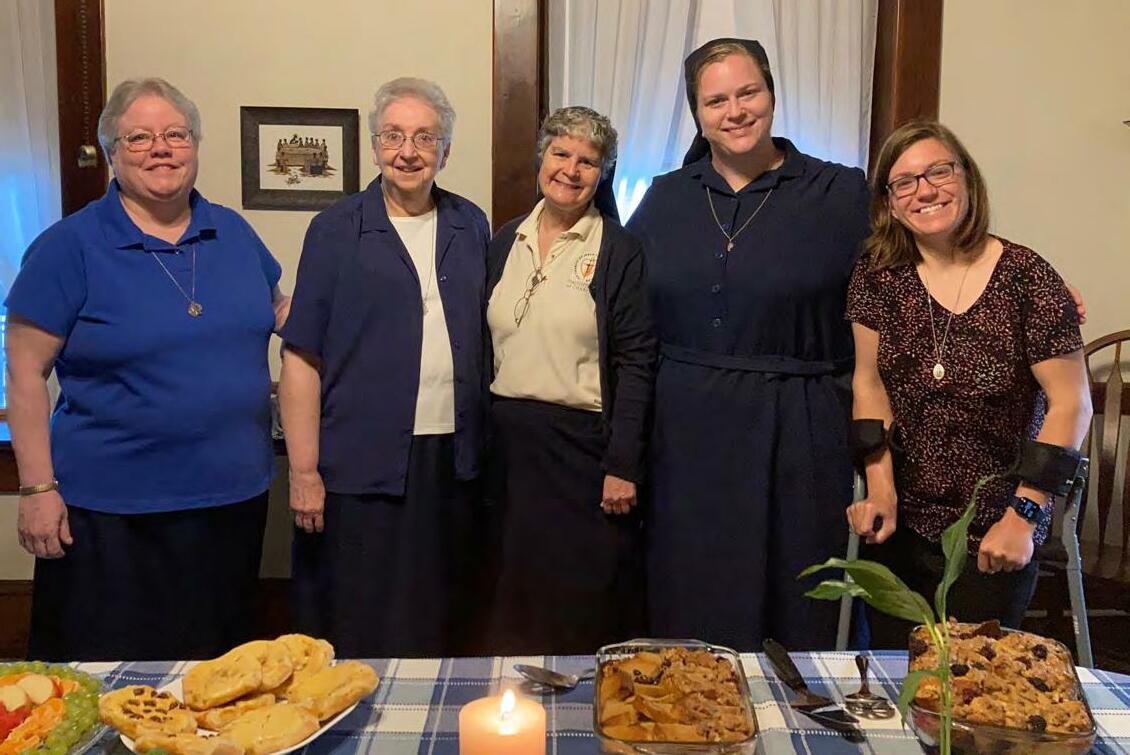
Further conversation takes place with Alex after supper. Her postulancy will end in August, when she will be joined by four others in the Seminary in St. Louis. Her call by God to community, like many past and present Daughters, took her by surprise. The Michigan native attended St. Mary’s College, a private, all-female Catholic liberal arts college at Notre Dame in Indiana. She earned a bachelor’s degree in accounting and after passing the difficult CPA test for licensure, Alex accepted a position at a prestigious accounting firm in Chicago.
Alex stayed 2½ years before deciding that the corporate world was not for her and never would be. She began working at a non-profit agency and recounts her two years there with unabashed enthusiasm.
“I loved everything about Chicago – my job, my apartment, my friends, my spiritual life,” she recalls. “But I still felt a longing for something more, that I was missing something. And I felt I was being ungrateful for not appreciating all that I had been given.”
Like Sister Kate, Alex began searching online. She felt she was being called by God, but not quite sure where to look or to start. “Discernment is a process. All I knew was that I wanted a community that had younger Sisters, too, and where I could remain a CPA and use my accounting skills. I was surprised to learn I could have both with the Daughters of Charity!”

Alex adds that although getting to know the Daughters through Zoom and online communication was good, there must be in-person visits to see if the community is a good fit for you, and vice versa. She particularly appreciated a road trip from Chicago, visiting Daughters at several houses in Evansville, St. Louis, and East St. Louis.
Alex spent a year as a pre-postulant in Harlingen, Texas, where she learned the importance of living in community, sharing responsibilities (including cooking, which is still a skill in need of perfecting for Alex) and, as a Daughter, accepting the challenge of an hour spent in silent meditation each day.
Alex freely admits that she loves to talk and admits, “I couldn’t imagine keeping silent for more than five minutes much less sixty!” She attributes Sister Liz Sojberg with helping her to not only master – but to look forward to – her quiet time in conversation with God.
And while Sister Liz is one of the younger Daughters at the house in Harlingen as is Sister Kate in Macon, Alex says she considers “intergenerational living a gift.”
“Your face, Lord, do I seek.”
As the time draws near for the visitor to leave, there’s a sense of loss, a spirit that has manifested itself with the places visited, the people met, witnessing the Daughters’ ministries. If one seeks God in Macon, they need look no further than the men and women at Daybreak, the tiny dancers wriggling to the beat of a sing-song ABC, the small child opening the first Christmas present ever received, the parent behind the wheel after an hour drive so the child can succeed in school – and in life.
God can be seen in the face of Martha, a volunteer at FAM who works alone upstairs, carefully sorting and assembling outfits, from infant size up to eight years old. “Each outfit I lay out,” she says, “matters to me as if the child being dressed is my own.” God is the face of someone sitting alone on a park bench or standing with hand outstretched on the street. God is the mother who has no food for her child or money for rent. God is in those who are often looked through or away from. Yet, for the Daughters on mission in Macon and the countless men and women who serve alongside them, God works through them to serve Him.
As Sister Theresa said of those who come seeking sanctuary at Daybreak, “How do people know they’re loved by God if they haven’t experienced God’s love in others?”
In Macon, Georgia, they do.
